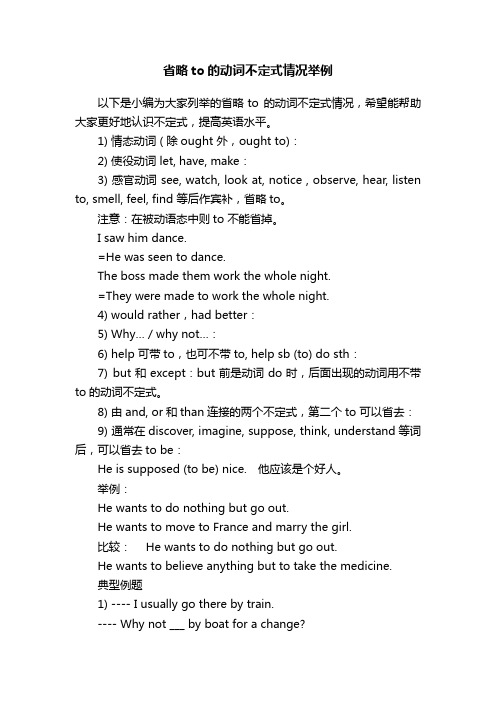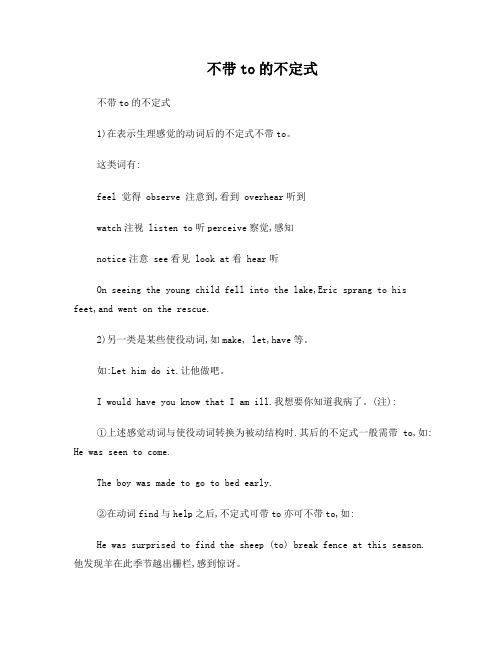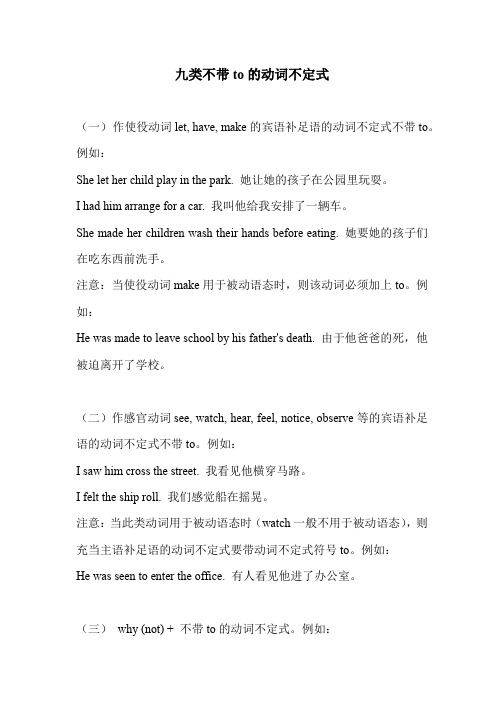英语不带to的动词不定式归纳
省略to的动词不定式情况举例

省略to的动词不定式情况举例以下是小编为大家列举的省略to 的动词不定式情况,希望能帮助大家更好地认识不定式,提高英语水平。
1) 情态动词 ( 除ought 外,ought to):2) 使役动词 let, have, make:3) 感官动词 see, watch, look at, notice , observe, hear, listen to, smell, feel, find 等后作宾补,省略to。
注意:在被动语态中则to 不能省掉。
I saw him dance.=He was seen to dance.The boss made them work the whole night.=They were made to work the whole night.4) would rather,had better:5) Why… / why not…:6) help 可带to,也可不带to, help sb (to) do sth:7) but和except:but前是动词do时,后面出现的动词用不带to的动词不定式。
8) 由and, or和than连接的两个不定式,第二个to 可以省去:9) 通常在discover, imagine, suppose, think, understand等词后,可以省去to be:He is supposed (to be) nice. 他应该是个好人。
举例:He wants to do nothing but go out.He wants to move to France and marry the girl.比较: He wants to do nothing but go out.He wants to believe anything but to take the medicine.典型例题1) ---- I usually go there by train.---- Why not ___ by boat for a change?A. to try goingB. trying to goC. to try and goD. try going答案:D. why not 后面接不带to 的不定式,因此选D。
不带to的不定式

不带to的不定式不带to的不定式1)在表示生理感觉的动词后的不定式不带to。
这类词有:feel 觉得 observe 注意到,看到 overhear听到watch注视 listen to听perceive察觉,感知notice注意 see看见 look at看 hear听On seeing the young child fell into the lake,Eric sprang to his feet,and went on the rescue.2)另一类是某些使役动词,如make, let,have等。
如:Let him do it.让他做吧。
I would have you know that I am ill.我想要你知道我病了。
(注):①上述感觉动词与使役动词转换为被动结构时.其后的不定式一般需带to,如: He was seen to come.The boy was made to go to bed early.②在动词find与help之后,不定式可带to亦可不带to,如:He was surprised to find the sheep (to) break fence at this season.他发现羊在此季节越出栅栏,感到惊讶。
3)在do nothing/anything/everything but(except)结构中。
例如:Last night I did nothing but watch TV.昨天晚上,我除了看电视别的什么也没有干。
但是,如果谓语动词不是“do nothing,anything,everything”,那么but(except)所跟的不定式则仍须带。
The doctor told him nothing but to stop smoking.医生除了让他戒烟,其它什么都没有说。
There was nothing for them to do but to remain silent.除了保持沉默以外,他们没有别有别的办法。
(完整版)省略to的动词不定式用法归纳

省略to的动词不定式用法归纳一、使役动词与to的省略当不定式用于let, make, have等使役动词后作宾语补足语,不定式必须省略to。
如:Let me have another cup of tea.给我再来一杯茶。
She had him dig away the snow.她让他把雪挖走。
They made him tell them everything.他们强迫他把一切全告诉他们。
但是,当使役动词用于被动语态时,其后的不定式则必须要带to。
如:他被迫一天工作20小时。
误:He was made work twenty hours a day.正:He was made to work twenty hours a day.注意,表示使役意义的let和have很少用于被动语态。
另外注意,force, oblige等虽然也表示“使”,但它们后用作宾语补足语的不定式必须带to。
如:They forced her to sign the paper.他们强迫她在文件上签字。
The law obliged parents to send their children to school.法律要求父母送子女上学。
考例:1.The teacher forbade ________ our seats. to leave leavingC.to leaveD.to leaving2.Mary had her friend ________ the best one.A.chooseB.chosenC.choseD.to choose3.The girl was ma de _________ she didn’t love at all.A.marry a manB.to marry a manC.to marry with a manD.married with a man二、感觉动词与to的省略当不定式用于表示感觉的动词feel, hear, notice, observe, see, watch, look at, listen to等作宾语补足语时,不定式必须省略to。
不带to的动词不定式通常有下面十八种情况

(1)We found the farm crops(to) do well.
(2)I find the Chinese people to be happy and cheerful.
(8)I had sooner live on a farm than in the city.
(9)He would sooner resign than take part in such dishonest business deeds.
(8)He observed someone open the door.
(9)I did not perceive anyone come in.
(10)He beheld her go out.
(5)Could you do something for me?
(6)You shall go at once.
(7)He might be working in the office now.
(4)I heard her play the piano.
(5)He listend to us talk.
(6)I felt the floor move.
(7)I didn’t notice you enter.
不带to的动词不定式通常有下面十八种情况.txt今天心情不好。我只有四句话想说。包括这句和前面的两句。我的话说完了对付凶恶的人,就要比他更凶恶;对付卑鄙的人,就要比他更卑鄙没有情人味,哪来人情味 拿什么整死你,我的爱人。收银员说:没零钱了,找你两个塑料袋吧! 不带to的动词不定式通常有下面十八种情况
英语中不带 to 的不定式

不定式有带to 和不带to 两种,以下例举不带to 的不定式。
一、助动词shall, should, will, would, may, might, do, did, can, could, must, need, dare 后接不带to 的不定式,例如:shall:I shall invite them.我将邀请他们。
should:You shouldn't drink and drive.你不该酒后驾车。
will:How long will you be staying in Paris?你将在巴黎待多久?would:We said we would keep them.我们说过要保存它们的。
may:That may or may not be true.这可能是真的,也可能不是。
might:He said he might come tomorrow.他说他明天可能来。
do:I don't like fish.我不喜欢鱼。
Don’t be late!别迟到!did:They didn't go to Paris.他们没去巴黎。
He didn’t eat meat.他不吃肉。
can:He can speak English.他会说英语。
could:She said that she couldn't come.她说她来不了啦。
must:We must go now.我们现在必须走了。
need:You need not go.你不必去。
dare:He dare not refuse.他不敢拒绝。
二、当need 和dare 用作实义动词时,后面接带to 的不定式,例如:need:I need to get some sleep.我需要睡会儿觉。
dare:Did he dare to do that?他敢那样做吗?三、感官动词 see, hear 等的直接宾语后面可以接不带to 的不定式作宾语补语,表示动作已经做过或是完成了,例如:see:I saw her go.我看见她走了。
九类不带to的动词不定式

九类不带to的动词不定式(一)作使役动词let, have, make的宾语补足语的动词不定式不带to。
例如:She let her child play in the park. 她让她的孩子在公园里玩耍。
I had him arrange for a car. 我叫他给我安排了一辆车。
She made her children wash their hands before eating. 她要她的孩子们在吃东西前洗手。
注意:当使役动词make用于被动语态时,则该动词必须加上to。
例如:He was made to leave school by his father's death. 由于他爸爸的死,他被迫离开了学校。
(二)作感官动词see, watch, hear, feel, notice, observe等的宾语补足语的动词不定式不带to。
例如:I saw him cross the street. 我看见他横穿马路。
I felt the ship roll. 我们感觉船在摇晃。
注意:当此类动词用于被动语态时(watch一般不用于被动语态),则充当主语补足语的动词不定式要带动词不定式符号to。
例如:He was seen to enter the office. 有人看见他进了办公室。
(三)why (not) + 不带to的动词不定式。
例如:Why not come and see me tomorrow? 明天来找我怎么样?(四)had better + 不带to的动词不定式。
例如:You'd better go now. 你最好现在走。
(五)rather than位于句首时,其后用不带to的不定式,但rather than 在句中时,其后的动词不定式可以带to,也可以不带toRather than ride on a crowded bus,he always prefers to ride a bicycle. He prefers to rent a car rather than(to) have one of his own.(六)在find后作宾语补定语的动词不定式有时可以省to,但如动词为be,那么一般不省to,要省一起省略"to be"We found the farm crops(to) do well.I find the Chinese people to be happy and cheerful.I found this to be true in all the cities.(七)在but(=except),besides,than后的动词不定式一般要带to,但如果其前有作谓语的实义动词do,则不定式不带toThe soldier has no choice but to obey.He did not have any choice but to obey.She did nothing but clean the dishes.(八)两个或两个以上的动词不定式并列在一起时,第一个不定式带to,后面的不定式一般省去toHer job is to take care of the children and wash clothes.(九)在动词help后作宾语补足语的动词不定式可以带to,也可以不带,在英国英语中,多用不带to的不定式,但在英国英语中,help+宾语+不定式结构中,用不带to的不定式表示主语直接参与不定式的表示的动作,用带to的不定式表示主语没有直接参与不定式的表示的动作。
高考英语省略to的动词不定式八种情况
高考英语省略to的动词不定式八种情况一、感觉动词后省略to的情况主语+ (四看see/watch/notice/look at,三使役let/make/have,两听listen to/hear, 一感觉feel)+宾语+do sth,省略to。
1. 在感觉动词后用作宾语补足语的不定式必须省略to。
1)这里所说的感觉动词主要包括see, hear, observe, notice, feel, watch等。
但是它们用于被动语态时,其后的不定式必须带to。
如:The woman was seen to enter a bank. 有人看见这个女人进了一家银行。
但是,用于以上句型的动词notice 和watch和通常不用于被动语态。
2)类似地,动词look at和listen to后用作宾语补足语的不定式也不带to。
如:We listened to the old man tell his story. 我们听这位老人讲述他的经历。
3)若动词feel后用作宾语补足语的不定式为to be,则要带to(其他情况不带to)。
如:They felt the plan to be unwise. 他们认为这个计划不明智。
4)若不定式为完成式,通常应带to。
如:I noticed her to have come early. 我注意到她来得很早。
2. 使役动词后省略to的情况在let, make, have等使役动词后用作宾语补足语的不定式必须省略to。
如:My mother wouldn’t let me go to the film. 我妈妈不会让我去看电影的。
1) 当使役动词用于被动语态时,要补上在主动语态中省略的to(主要是指make,let和have很少用于被动语态)。
2) force, oblige等虽然也表示“使”,但它们后用作宾语补足语的不定式必须带to。
如:He forced me to go with them. 他迫使我同他们一起去。
246 不带to的不定式
246 不带to的不定式A can,do,may,must,shall,will之后接不带to的不定式:They could do it today.他们可以今天做这件事。
I may as well start at once.我还不如马上就动身。
He will probably object.他可能会反对。
B need和dare之后也接不带to的不定式,但它们不作为情态动词而是同助动词do/did或will/would连用时除外:You needn’t say anything.你不必说什么。
但是说:You don’t/won’t need to say anything.你不需要/将不需要说什么。
I dared not wake him.我不敢叫醒他。
但是说:I didn’ t/wouldn’ t dare(to) wake him.我没敢/不敢叫醒他。
理论上,在最后一个例句中要求用to,但实际上常被省略。
按语法规则来说,如果dare和used用为助动词,它们就像大多数助动词一样后面接不带to的不定式;如果它们用为普通动词并与do/ did等连用,就像普通动词一样后面接带to的不定式。
C feel, hear, see和 watch:I heard him lock the door.我听见他锁了门。
I saw/watched him drive off.我看见他开车走了。
但see和hear在被动语态的句子中要与带to的不定式连用:He was seen to enter the office.有人看见他进了办公室。
He was heard to say that…有人听见他说过……但feel,hear,see和watch经常是与现在分词连用:I heard them shouting.我听到他们在大声喊叫。
(参见第273节。
)D let在主动语态和被动语态的句子中都与不带to的不定式连用。
英语中不定式省略to的10种情况
英语中不定式省略to的10种情况一、使役动词与to的省略当不定式用于let, make, have等使役动词后作宾语补足语,不定式必须省略to。
如:Let me have another cup of tea. 给我再来一杯茶。
She had him dig away the snow. 她让他把雪挖走。
They made him tell them everything. 他们强迫他把一切全告诉他们。
但是,当使役动词用于被动语态时,其后的不定式则必须要带to。
如:他被迫一天工作20小时。
误:He was made work twenty hours a day.正:He was made to work twenty hours a day.注意,表示使役意义的let和have很少用于被动语态。
另外注意,force, oblige等虽然也表示“使”,但它们后用作宾语补足语的不定式必须带to。
如:They forced her to sign the paper. 他们强迫她在文件上签字。
The law obliged parents to send their children to school. 法律要求父母送子女上学。
二、感觉动词与to的省略当不定式用于表示感觉的动词feel, hear, notice, observe, see, watch, look at, listen to等作宾语补足语时,不定式必须省略to。
如:We all felt the house shake. 我们都感觉这房子在震动。
I heard him go down the stairs. 我听见他下楼了。
Did you notice her leave the house? 她离开屋子你注意到了吗?I watched her get into the car. 我看着她上了车。
但是,当feel后用作宾语补足语的不定式为to be时,则不能省略to。
英语中的动词不定式构成
动词不定式构成:to+ do(动词原形)否定式:not to+do 动词原形动词不定式特点:动词不定式没有人称和数的变化,在句子中不能独立作谓语。
可以在句子中作主语、宾语、表语、宾语补足语、定语、状语.一. 带to的不定式结构1. 我们学过的能直接跟带to的不定式结构的动词主要有:want, ask, tell, hope, learn, try, decide, forget, remember, like , love, stop, go, come等。
二. 不带to的不定式结构以下几种情况使用不带to的动词不定式:1. 在固定词组had better之后。
注意:had better的否定形式是had better not do sth.。
例如:You had better go home now. 你最好现在回家。
It's cold outside. You’d better not go out. 外面很冷,你最好不要出去。
2. 在let, make, see, feel, watch, hear等感官或使役动词后,要跟不带to的动词不定式作宾语补足语。
例如:I made them give me the money back. 我迫使他们把钱还给我。
I didn’t see you come in. 我没看见你进来。
3. 在引导疑问句的why not之后。
“Why not+不带to的不定式”是“Why don’t you do…”的省略,可以用来提出建议或劝告。
例如: Why not go with us? 为什么不和我们一起去呢?Why not take a holiday? =Why don’t you take a holiday? 为什么不休假呢?三.动词不定式的句法功能:(一)作主语不定式结构作主语时,现代英语倾向于采用it作形式主语,而把不定式结构后置的形式。
e.g. It’s easy (for me) to do that.我做这事太容易了。
- 1、下载文档前请自行甄别文档内容的完整性,平台不提供额外的编辑、内容补充、找答案等附加服务。
- 2、"仅部分预览"的文档,不可在线预览部分如存在完整性等问题,可反馈申请退款(可完整预览的文档不适用该条件!)。
- 3、如文档侵犯您的权益,请联系客服反馈,我们会尽快为您处理(人工客服工作时间:9:00-18:30)。
不带to的动词不定式的十八种情况动词不定式通常带有符号to,叫做带to的动词不定式(infinitive with"to"),动词不定式有时不带符号to,叫做不带to的动词不定式(infinitive without"to")不带to的动词不定式通常有下面十八种情况一、与助动词do连用构成谓语动词的否定、疑问和强调形式。
(1)he does not work in the factory.(2)Does she work here?(3)I did not see her yesterday.(4)Did they take you home?(5)He does look tired.(6)They did come yesterday.二、与情态动词连用构成复合谓语(1)I can speak English.(2)May I come in?(3)Dare he swim across the river?(4)We must work,and above all we must believe in ourselves.(5)Could you do something for me?(6)You shall go at once.(7)He might be working in the office now.(8)I don't think you need have come yesterday.(9)They should be here by now.(10)If you will go into the fields and turn over a few big stones,you are sure to uncover a city of ant"people".但与情态动词ought(to)连用时通常带to,和used(to)连用时必须带to三、在表示感觉的动词如:see,look.at,watch,hear,listento,feel,notice,observe,perceive(觉察,看见),behold(书面用语“见到”)等后用作宾语补足语的动词不定。
(1)I saw her cross the street.(2)He looked at the children walk up the hill.(3)I watched the boy cross the road.(4)I heard her play the piano.(5)He listend to us talk.(6)I felt the floor move.(7)I didn’t notice you enter.(8)He observed someone open the door.(9)I did not perceive anyone come in.(10)He beheld her go out.但除notice,watch不用被动语态外,上述动词变成被动语态时,其后的动词不定式就不省to (1)She was seen to cross street.(2)She was heard to play the piano.四、使役动词make,let,have,bid, leave(=let)后作宾语补足语的动词不定式不带to(1)You may take a horse to the water,but you can't make him drink.(2)I'll let him do it.(3)Don't forget to have them come.(4)Bid him go home.(5)Leave him go.动词have通常不用于被动语态,make和bid可用于被动语态,let偶尔也可用于被动态,用作主语补足语的动词不定式通常带to,但在make和let后有时可以不带to(1)John was made to wash the truck for a week as a punishment.(2)He was made(to) laugh.(3)The child was let(to) do it.五、never与know连用其后作宾语补足语的动词不定式可省to,其时态多为完成时态。
(1)I never knew him act without thinking.(2)I've never known it snow in July before.(3)I had never known her ask for pity before.有时ever与known连用也有上述用法。
(1)Have you ever known me tell a lie?六、在find后作宾语补定语的动词不定式有时可以省to,但如动词为be,那么一般不省to,要省一起省略"to be"(1)We found the farm crops(to) do well.(2)I find the Chinese people to be happy and cheerful.(3)I found this to be true in all the cities.(4)We found him (to be) honest/dishonest.七、在cannot but,cannot help but,can not choose but, had better(best),would(had) rather(sooner)…than…, would as soon…as…后的动词不定一般不带to(1)When the country calls you for help,you cannot but go.(2)He can't help but feel sorry for her.(3)he cannot choose but obey.(4)I had better leave now,or I'll be late.(5)He had best buy it now while it is still available.(6)I would rather go mountain—climbing than just take a walk.(7)My aunt invited me to the movies,but I said I had rather go on a picnic with the girls.(8)I had sooner live on a farm than in the city.(9)He would sooner resign than take part in such dishonest business deeds.(10)I'd rather not tell you.(11)He said he'd sooner die than betray his friend.八、在but(=except),besides,than后的动词不定式一般要带to,但如果其前有作谓语的实义动词do,则不定式不带to(1)The soldier has no choice but to obey.(2)He did not have any choice but to obey.(3)She did nothing but clean the dishes.(4)The children found there was nothing they could do with their money,except spend it on sweets.(5)There seemed nothing else to do but(to)send for a doctor.(but前的实义动词do不作谓语,but后的不定式可带to,也可不带to)(6)He did nothing else than laugh.(7)I could hardly do less than wait.九、不定式作表语时,如主语部分含有实义动词do,且句子的时态为一般现在时或一般过去时(多为is或was),不定式可以带to也可不带to(1)What we must do now is(to) find anther person to help us.(2)All he could do was (to) rush into the room. 如句子的动词时态不是一般现在时或一般过去时,作表语的动词不定式一般要带to(1)She knew that all she would have to do would be to stop crying.十、rather than位于句首时,其后用不带to的不定式,但rather than在句中时,其后的动词不定式可以带to,也可以不带to(1)Rather than ride on a crowded bus,he always prefers to ride a bicyde.(2)Rather than cause trouble,he left.(3)He prefers to rent a car rather than(to) have one of his own.十一、在动词help后作宾语补足语的动词不定式可以带to,也可以不带,在英国英语中,多用不带to的不定式,但在英国英语中,help+宾语+不定式结构中,用不带to的不定式表示主语直接参与不定式的表示的动作,用带to的不定式表示主语没有直接参与不定式的表示的动作。
(1)He helped me repair the bicycle.(2)He helped me to repair the bicycle.(3)This kind of soap helps us to wash the clothes more easily.(4)The book will help you to study English. 但在被动语态中,help后的不定式要带to(1)She was helped to repair her bicycle. 在help(to) do sth不定式符号to可省略。
He helped(to) repair the machine.十二、两个或两个以上的动词不定式并列在一起时,第一个不定式带to,后面的不定式一般省去to(1)Her job is to take care of the children and wash clothes.(2)The girl doesn't know how to read and write.但如果是在对照场合,则不省去to(1)It is better to laugh than to cry.(2)The purpose of new technologies is to make life easier,not to make it more difficult.十三、than连接两个动词不定式没有对比关系时,后一个不定式可以省to(1)You might do worse than(to) do as he does.(2)I cannot do better than(to)get away for the few days.下面句子中than连接的不是两个动词不定式than后的动词不定式通常要带to(1)I know better than to believe him.(2)The beaten enemy had no choice than to surrender.下句中的more than(=only)可以看成复合副词,后面的动词不定式不带to(1)I did not more than make a beginning.十四、在why,why not后的不定式不带to(1)Why spend such a lot of money?(2)Why not join us? (3)Why don't you smoke?十五、实义动词dare在现代英语口语中,其所在的否定句或疑问句中,它后的动词不定式可省to,尤其在一般过去时中(1)Does he dare go?(2)We do not dare speak.(3)He did not dare go.(4)Did he dare go?(5)He dared go.(6)Dared he go?(7)He knew she dared not open his mouth.十六、在口语中,特别是在美国,祈使语气谓语动词和构成谓语的不定式go后面的不定式往往不带to(1)Go ask her.(2)I'll go see my brother.这种用法在英国口语中比较少见,一般在动词go后用连词and(1)GO and ask her.(2)I'll go and see my brother.十七、在"will you please…?"和would you please…?句型中,要用不带to的不定式。
